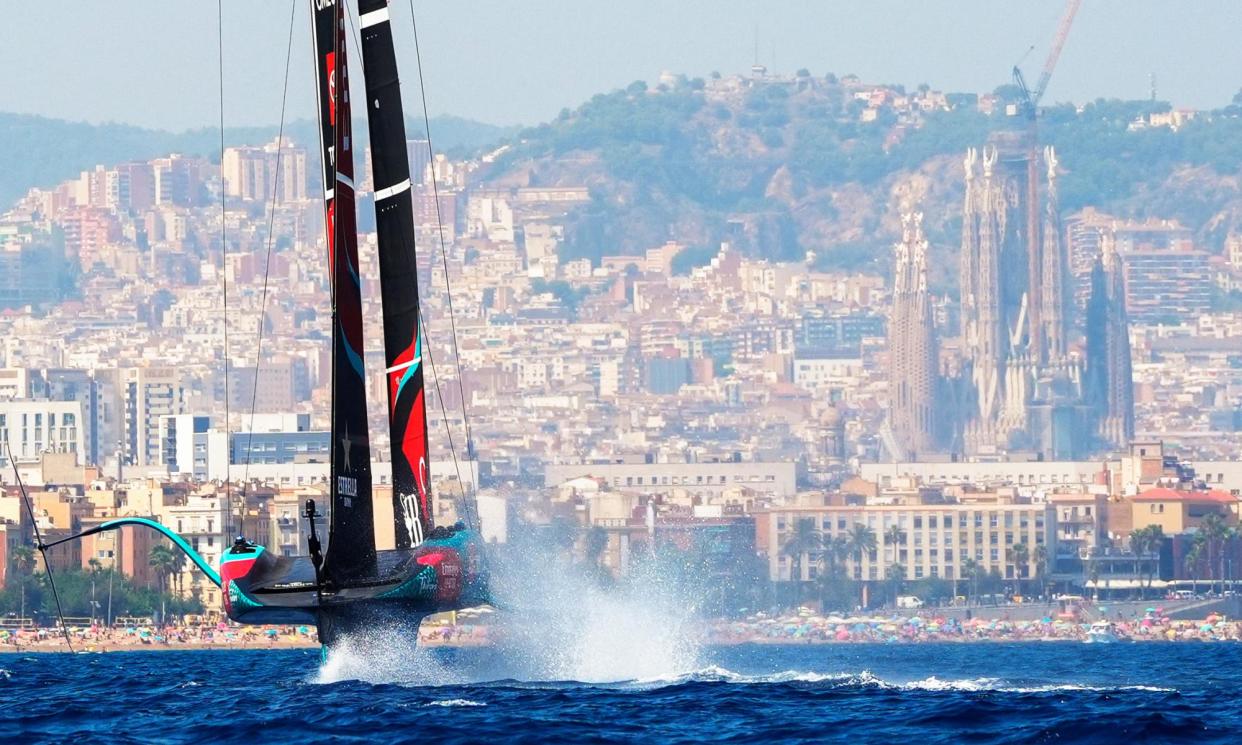‘It’s about money’: doubt over America’s Cup benefits in tourist hotspot Barcelona

According to its supporters, the America’s Cup, which weighed anchor last week in Barcelona, will bring in €1bn, create 19,000 jobs and, by the time the last sail is furled on 20 October, have attracted an extra 2.5 million visitors to the city.
The ultimate sporting competition for the super-rich marks the latest attempt by the Spanish city to attract “quality rather than quantity” tourism.
“The people who follow the America’s Cup are people who love the sea and have plenty of disposable income,” said Mateu Hernández, the head of the public-private body Barcelona Tourism.
“We are interested in these people. We need to improve the quality of those who visit. But people confuse quality with wealth. What we want is people who come here to do something, whether it’s to visit museums or enjoy the architecture and the gastronomy.”
Barcelona has been on the frontline of what has been described as an overtourism crisis in Spain, which last year received a record 85.1 million international tourists, up 19% on 2022. Growing anger and frustration over the unchecked growth of tourism has prompted a number of protests in recent months on the mainland and in the Balearic Islands and the Canaries.
To many local people, Hernández’s promise sounds unnervingly like the Monte Carlo model of pricing out all but the wealthiest visitors, with residents suffering the collateral damage. Opponents of staging the America’s Cup in Barcelona say they do not see how people living in the city will benefit.
“No one has explained where this €1bn is going to be distributed,” said Martí Cusó, a spokesperson for the Platform Against the Cup, an umbrella group representing about 150 community organisations.
Meanwhile, he says, temporary lettings in Barceloneta, the seafront neighbourhood that is a focal point during the competition, have risen to €4,000-€5,000 a month. “We’re also worried that holding this competition reinforces the idea that the economy of Barcelona has to be based on tourism, whereas what we want is diversification,” Cusó said.
The America’s Cup was first staged on and around the Isle of Wight in 1851. Emirates Team New Zealand is the defending champion and will be challenged by boats from the UK, Italy, Switzerland, France and the US.
Hernández said the 1992 Olympics opened Barcelona to the beach, while the America’s Cup looked to the sea to make sailing, viewed as an elite sport in Spain, accessible to all.
The elitism charges may be hard to shake off, however. Marina Port Vell, the company that runs the port, has invited guests to enjoy “gourmet cuisine, VIP onboard programmes to watch the competition live from premium vessels, and luxury boutiques featuring leading international brands”.
Sebastian Rouse, who runs Barcelona Watersports, a sailing school that also runs marine excursions, took a sanguine view.
“The first thing they did was increase the mooring fee for a sailing yacht from €1,000 to €15,000 a month for the duration of the event, which doesn’t say much for their loyalty to a business that’s been operating here for over 10 years,” he said.
Related: ‘Elitist and opaque’: Barcelona residents oppose America’s Cup and related tourism
The implication is that so much money could be made taking fans out to watch the race that business owners could easily recoup the cost, but Rouse and others in the business say that although they remain optimistic, there have been few takers.
Ivy Scrancher, a local skipper, said: “You have to pay a lot of money for permission to get close to the race, and even then you’ll need a big screen onboard to understand what’s going on.”
As for creating jobs, she said virtually none of the race organisers were local. “All the people on the chase boats, the engineers, all the people who are actually making money from this big event aren’t from here,” Scrancher said. “They come from New Zealand or Australia or elsewhere. They make 12 or 20 grand a month and take it back home. The only Spanish people involved are volunteers.”
Esther Jorquera, a Barceloneta resident, also railed against the lack of paid jobs for locals. “They promised us jobs and then ask us to work for free,” she said. “The 2,000 volunteers they’ve recruited should be 2,000 jobs.”
On a recent visit by the Guardian to the fan zone in Barceloneta, a few dozen people were watching on a giant screen as the yachts, extraordinary feats of engineering and seamanship, fizzed over the surface of the water while a commentator explained their manoeuvres.
Cusó said the comparison with the Olympics, where young people from around the world compete and represent their countries, was erroneous. “We’re talking about teams sponsored by Prada, Louis Vuitton, Emirates,” he said. “It’s about money.”


